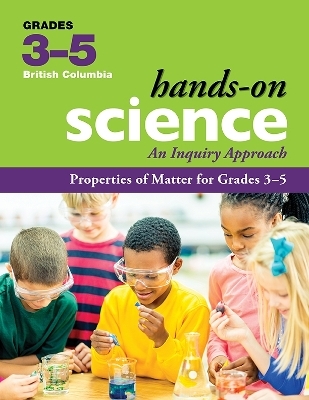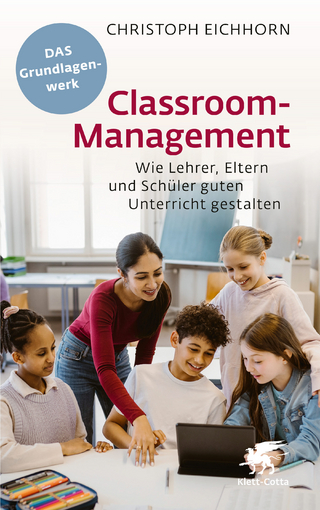
Properties of Matter for Grades 3-5
Portage & Main Press (Verlag)
978-1-55379-879-8 (ISBN)
- Titel z.Zt. nicht lieferbar
- Versandkostenfrei
- Auch auf Rechnung
- Artikel merken
emphasizes Core Competencies, so students engage in deeper and lifelong learning
develops Curricular Competencies as students explore science through hands-on activities
fosters a deep understanding of the Big Ideas in science
Using proven Hands-On features, Properties of Matter for Grades 3–5 contains information and materials for both teachers and students including: Curricular Competencies correlation charts; background information on the science topics; complete, easy-to-follow lesson plans; digital reproducible student materials; and materials lists.
Innovative new elements have been developed specifically for the new curriculum:
a multi-age approach
a five-part instructional process—Engage, Explore, Expand, Embed, Enhance
an emphasis on technology, sustainability, and personalized learning
a fully developed assessment plan for summative, formative, and student self-assessment
a focus on real-life Applied Design, Skills, and Technologies
learning centres that focus on multiple intelligences and universal design for learning (UDL)
place-based learning activities, Makerspaces, and Loose Parts
In Properties of Matter for Grades 3–5 students investigate matter. Core Competencies and Curricular Competencies will be addressed while students explore the following Big Ideas:
Humans interact with matter every day through familiar materials.
Materials can be changed through physical and chemical processes.
Matter is useful because of its properties.
Download the FREE digital resources (image banks and reproducibles) that accompany this book by following the instructions printed on the first page of the Appendix.
Jennifer E. Lawson, PhD, is the creator of the Hands-On books published by Portage & Main Press. As senior writer and editor for the series, she has contributed to more than 50 publications for teachers and students. Jennifer provides professional development workshops for educators locally, nationally, and virtually, and is a Workplace Wellness Advisor. Her most recent book is a collective effort called Teacher, Take Care: A Guide to Well-Being and Workplace Wellness for Educators. She is also one of the founders of Mission to Mexico, an organization that supports schools in some of the most impoverished communities in Puerto Vallarta. Throughout her extensive career in education, Jennifer has worked as a classroom teacher, resource and special education teacher, consultant, principal, university instructor, and school trustee. She lives with her family in Winnipeg, Manitoba. Desiree Marshall-Peer (MA, BSC) is a Cree-Ojibway educator focusing on re-envisioning the British Columbia education system in innovative ways. Desiree has several years’ experience with the BC Ministry of Education renewed curriculum and competencies, with input on graduation transformations, and assessment. She has certification in Design Thinking and Maker philosophy. Desiree is currently a professor at the UBC-Okanagan School of Education. Rosalind Poon has been a science teacher and Teacher Consultant for Assessment and Literacy with the Richmond School District for the past 18 years. In her current role, she works with school teams to plan and implement various aspects of the curriculum by collaborating with teams in professional inquiry groups on topics such as descriptive feedback, inquiry, assessment, and differentiation. Her passions include her family, dragon boating, cooking with the Instant Pot and making sure that all students have access to great hands-on science experiences. Lisa Schwartz has been a Teacher Consultant for Assessment and Literacy with the Richmond School District for the past six years. As a consultant, Lisa facilitates professional learning with small groups and school staffs on topics such as the redesigned curriculum, Core Competencies, differentiation, inquiry, and assessment. She also works side by side with teachers co-planning, co-teaching and providing demonstration lessons to highlight quality, research-based instruction that supports all learners. Lisa is passionate about engagement, joyful learning, and success for all students. Desiree Marshall-Peer (MA, BSC) is a Cree-Ojibway educator focusing on re-envisioning the British Columbia education system in innovative ways. Desiree has several years’ experience with the BC Ministry of Education renewed curriculum and competencies, with input on graduation transformations, and assessment. She has certification in Design Thinking and Maker philosophy. Desiree is currently a professor at the UBC-Okanagan School of Education. Melanie Nelson is from the In-SHUCK-ch and Stó:loˉ Nations, and has experience teaching kindergarten through grade 12, as well as adults in the Lower Mainland of British Columbia. She has taught in mainstream, adapted, modified, and alternate settings, at the classroom, whole school, and district levels. Trained as an educator in science, Melanie approaches Western science through an Indigenous worldview and with Indigenous ways of knowing. Her Master of Arts thesis explored the experience of Indigenous parents who have a child identified as having special needs in school, and she is currently completing a Doctor of Philosophy in School Psychology at the University of British Columbia.
Introduction to Hands-On Science 5
About Hands-On Science 5
Format of Hands-On Science 5
The Multi-Age Approach 6
Inquiry and Science 6
The Goals of Science Education in British Columbia 6
Hands-On Science Principles 7
Cultural Connections 8
Indigenous Perspectives and Knowledge 9
References 12
How to Use Hands-On Science in Your Classroom 13
Multi-Age Teaching and Learning 13
Module Overview 13
Talking Circles 16
Multiple Intelligences Learning Centres 17
Icons 18
Makerspaces 19
References 20
Curricular Competencies: How to Infuse Scientific Inquiry Skills and Processes Into Lessons 21
Observing 21
Questioning 21
Exploring 21
Classifying 22
Measuring 22
Communicating, Analyzing, and Interpreting 23
Predicting 25
Inferring 25
Inquiry Through Investigation and Experimentation 25
Inquiry Through Research 26
Addressing Students’ Literacy Needs 27
Online Considerations 27
References 28
The Hands-On Science Assessment Plan 29
Student Self-Assessment 29
Formative Assessment 31
Summative Assessment 32
Indigenous Perspectives on Assessment 33
Connecting Assessment to Curricular Competencies 33
Module Assessment Summary 34
Important Note to Teachers 34
References 34
Assessment Reproducibles 35
What Are the Properties of Matter? 59
About This Module 60
Curriculum Learning Framework 64
Curricular Competencies Correlation Chart 65
Resources for Students 67
1 Initiating Event: What Do We Observe, Think, and Wonder About Solids, Liquids, and Gases in Nature? 71
2 What Can We Learn About Solids, Liquids, and Gases Through Stories? 77
3 What Do We Know About Matter? 82
4 What Are Some Properties of Solids? 88
5 What Are Some Properties of Liquids? 92
6 What Are Some Properties of Gases? 99
7 What More Can We Learn About Gases? 107
8 How Does Heat Affect Water? 113
9 How Does Heat Affect Matter? 121
10 How Do Different Substances Interact With Water? 126
11 How Do Substances Interact to Produce Gases? 131
12 How Can We Test the Solubility of Different Substances? 137
13 What Are Some Properties of Solutions? 142
14 How Can Solutions Be Separated? 146
15 Inquiry Project: What More Can We Learn About the Properties of Matter? 152
Appendix: Image Banks 157
About the Contributors 163
| Erscheinungsdatum | 09.03.2022 |
|---|---|
| Co-Autor | Rosalind Poon, Lisa Schwartz, Desiree Marshall-Peer |
| Mitarbeit |
Berater: Desiree Marshall-Peer |
| Zusatzinfo | Illustrations |
| Sprache | englisch |
| Maße | 215 x 279 mm |
| Themenwelt | Schulbuch / Wörterbuch ► Unterrichtsvorbereitung |
| Sozialwissenschaften ► Pädagogik ► Schulpädagogik / Grundschule | |
| ISBN-10 | 1-55379-879-1 / 1553798791 |
| ISBN-13 | 978-1-55379-879-8 / 9781553798798 |
| Zustand | Neuware |
| Informationen gemäß Produktsicherheitsverordnung (GPSR) | |
| Haben Sie eine Frage zum Produkt? |
aus dem Bereich


